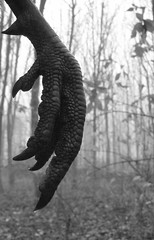 Every once in a blue moon you happen across a novel that pulls everything together, bundling interesting characters, big themes, an engaging plot and a winning style into a single package. But such books are rare. Even an extremely talented author has a hard time producing more than one in a career. Still, efforts that fall short of that Platonic ideal often excel in a narrower range, making up for their deficiencies with depth in other areas. One such example is D.M. Cornish's Foundling, the first volume in the YA series Monster Blood Tattoo.
Every once in a blue moon you happen across a novel that pulls everything together, bundling interesting characters, big themes, an engaging plot and a winning style into a single package. But such books are rare. Even an extremely talented author has a hard time producing more than one in a career. Still, efforts that fall short of that Platonic ideal often excel in a narrower range, making up for their deficiencies with depth in other areas. One such example is D.M. Cornish's Foundling, the first volume in the YA series Monster Blood Tattoo.Rossamsünd Bookchild has always hated his name. The other residents of Madam Opera's Estimable Marine Society for Foundling Boys and Girls never tire of reminding him that he's a male with a female moniker. He really had no choice in the matter, though. When he was unceremoniously abandoned on the Society's doorstep as a squalling bundle, that despised name was printed on a scrap of paper affixed to his clothes. Rossamünd wants to become a vinegaroon when he grows up, one of those hearty souls who braves the caustic, multi-colored seas in vessels powered by biological motors. Yet when the time comes, he gets snapped up by the lamplighters, solitary wanderers who keep alight the boundaries between civilized realms and the lands of the monsters. Rossamünd doesn't know what to think about his prospects. Becoming a lamplighter sounds exciting, but aren't the beasts who roam the hinterlands dangerous? He has no idea. While seeking to realize his destiny, Rossamünd will see that those who hunt monsters can prove every bit as awful as their prey.
To be forthright, Foundling isn't a book you'll read for style. Cornish prose is serviceable but unremarkable. Ditto for his flat characters and a largely predictable plot. Where he succeeds, though, is setting, and there he drives it out of the proverbial park. Outside of Tolkien and perhaps VanderMeer, I don't know if I've ever seen a secondary world that displays such originality of thought. Monster hunters battle their prey with specially compounded chemical regents or undergo experimental surgeries to grant themselves electrokinetic powers. Every vanquished foe gets commemorated with a tattoo inked in the creature's own ichor, hence the series' name. Hyper-perceptive trackers wear boxes containing alien sensory organs over their faces, allowing them to grow into their ears and eyes. Black-market traders cobble together hideous revenants out of cast-off corpses. Then there's an entire menagerie of beasties, chronicles of epic history and strange new geographies that I won't even try to recount. In fact, I really don't need to since Foundling contains an explicarium (a glossary, really) running over 100-pages long. Where Cornish's novel succeeds, it does so with panache aplenty.
(Picture: CC 2006 by cactusmelba; Hat Tip: Nathaniel Lee)


No comments:
Post a Comment